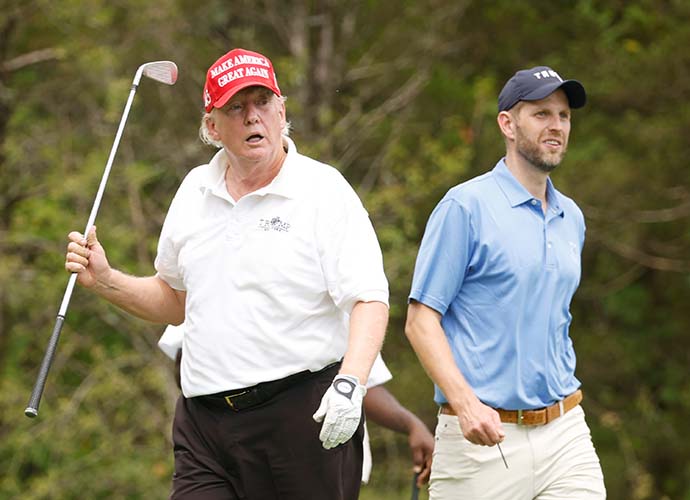Trump Org’s Former Controller Testifies Eric Trump Directed Him To Inflate Property Values In Court
On Friday, The Trump Organization’s former controller, Jeff McConney, testified that Eric Trump pushed him to inflate the valuations of several of the Trump properties.
The first week of the civil fraud trial came to an end on Friday, as Eric Trump and Donald Trump Jr. testified alongside McConney, also a co-defendant along with former President Donald Trump.
Internal Trump Organization spreadsheets shown in court on Friday display McConney’s notations that Eric had directed McConney in a phone conversation about specific property valuations. These valuations later appeared on the financial statements that were ruled fraudulent by the judge. Some of these properties include Seven Springs and the Trump National Gold Club Westchester.
Eric’s attorneys have argued that he was unaware that those phone calls with McConney were indeed used to formulate value assets in the financial statements for Trump properties. Trump has attended the trial for three days and has been issued a gag order after continual false allegations about one of Judge Arthur Engoron’s clerks.
The former president recently fell off the Forbes 400 List of richest people for the first time in decades, further adding to his woes.
Christopher Kite, one of Trump’s attorneys, stated on Friday in a separate appeals court: “I can tell you this trial, in all my 33 years, it’s chaos.”
Trump’s long-time chief financial officer, Allen Weisselberg, is expected to testify on Tuesday when the trial resumes. He served five months in prison for his role in a decade-long tax fraud scheme.
When questioned by New York Assistant Attorney General Andrew Amer, McConney said that he calculated Mar-a-Lago’s valuation as if it could be sold as a private residence. However, he did not know whether Trump had deeded away his right to develop the property past its use as a social club in 2005.
McConney also reported that when he and Weisselberg calculated the value of apartments at Trump Park Avenue, they consciously decided not to list the units as rent-stabilized. This significantly lowered the real-estate value, as the units cannot be rented at market price. McConney said that he and Weisselberg added value to multiple Trump golf courses based on the inherent value of the Trump brand.
The annual statements of financial condition included a note that stated: “The goodwill attached to the Trump name has significant financial value that has not been reflected in the preparation of this financial statement.”
>CELEBRITY MUGSHOTS – FAMOUS PEOPLE AT THEIR LOWEST
McConney testified that when he had valued Trump’s Seven Springs development in 2011, he had included the value of seven homes that were not yet built at the property. He testified that this was at Eric’s direction. McConney also included 71 unbuilt units as realized profits when he valued Trump’s Briarcliff New York golf course. He said that he did this on multiple financial statements, even when the development approval of those units was on pause.
RELATED ARTICLES
Get the most-revealing celebrity conversations with the uInterview podcast!









Leave a comment